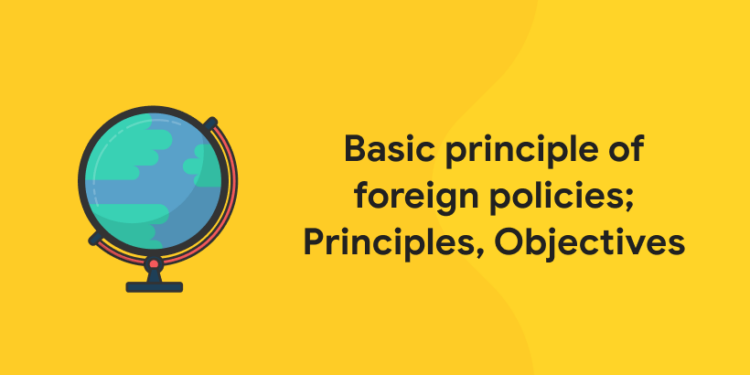Table of Contents
Like every sovereign countries has its foreign policies, India too has its own foreign policy. India’s foreign policies determined by several factors history, culture, geography and economy. Our Former Prime Minister Jawaharlal Nehru, gave a specific pattern to the country’s foreign policies. Basically, foreign policy is mentions the sum total of the principles, interest and objectives which a country promotes while interacting with other countries.
Foreign Policy of India
- A country’s foreign policy is the set of principles, interests, and goals that it promotes in its interactions with other countries.
- The objectives and activities of a state’s foreign policy or external policy (as opposed to its internal or domestic policy) in relation to its interactions with other states, unions, and other political entities, whether bilaterally or through multilateral platforms.
- It states that “domestic considerations, the policies or behaviour of other states, or plans to advance specific geopolitical designs” can all influence a government’s foreign policy.
|
Objectives of Indian Foreign Policy
|
Principles of Indian Foreign Policy
|
|
|
The Constitutional Principle
-
Promote international peace and security.
-
Maintain just and honorable relations between nations.
-
Foster respect for international law and Treaty obligations in the dealings of organized people with one another,
-
Encourage settlement of international disputes by arbitration
Attempt Free GK Mock test ! Download Entri App!
Features of Indian Foreign Policy
The principles of Indian foreign policy are as follows,
- Panchsheel
- The policy of Non-Alignment
- The policy of Anti- Colonialism
- Afro Asian Unity Policy
- The policy of Anti Racism
- Foreign Economic Aid
Panchsheel
-
Respect each other’s territorial integrity and sovereignty,
-
Mutual non-aggression,
-
Mutual non-interference,
-
Equality and mutual benefit, and
-
Peaceful co-existence.
The policy of Non-Alignment
Non-alignment has been an important feature of India’s foreign policy. The aim of Non-alignment was to maintain national independence in foreign affairs.
Non-alignment was neither neutrality nor non-involvement nor isolationism. It was a dynamic concept. Furthermore, Non-Alignment gained popularity in the developing countries.
The policy of Anti- Colonialism
-
in favour of Indonesia’s nationality fighting the Dutch colonialism in 1947,
-
against South Africa’s illegal occupation of Namibia
Afro Asian Unity policy
The policy of Anti Racism
India firmly believes in the equality of all human beings. Her policy is aimed at opposition to all form of racial discrimination.
India firmly opposed the infamous apartheid policy in South Africa. Not only India had cut off diplomatic relations with South Africa in 1949 but also used her influence in the application of comprehensive sanctions (later) against the white minority racist Regime of South Africa.
Foreign Economic Aid
After independence, India realized the importance of economic development. Also, it knew the limitations of herself. India was lacking funds, technical know-how and machinery.
By adopting NAM policy, India killed two birds with one stone. Amazingly, India took the best of both the worlds. Moreover, India approached USSR and USA for help and it went well for India. USSR helped India with technology. Also, USA came up with grains in 1965 famines.
Attempt Free GK Mock test ! Download Entri App!
Objectives of Indian Foreign Policy
Preservation of national interest, achievement of world peace, disarmament, independence for Afro-Asian nations
have been important objectives of India’s foreign policy. These objectives are sought to be achieved through some guiding principles such as Panchsheel, NAM, and others.
- To safeguard India against both traditional and non-traditional threats.
- To create an external environment that is conducive to India’s inclusive development, so that the country’s growth benefits can reach the poorest of the poor.
- To ensure that India’s voice is heard in international forums and that India has the ability to influence world opinion on global issues like terrorism, climate change, disarmament, and reforms of global governance institutions.
- To reach out to and protect the Indian diaspora.
The preservation of India’s territorial integrity and independence of foreign policy:
The territorial integrity and protection of national boundaries from foreign aggression is the core interest of a nation. India had gained a hard earned independence from foreign rule after long time. Thus, it was natural for her to give due emphasis on the independence of foreign policy. India’s effort to strengthen Afro-Asian solidarity endorsement of principles of non-interference, in the internal affairs of other nations and finally the adoption of the policy of nonalignment should be seen in this light.
Promoting international peace and security:
India as a ‘newly independent and developing country rightly realized that international peace and development are correlated. Her emphasis on disarmament and the policy of keeping away from the military alliances is intended to promote global peace.
Economic development of India:
Fast development of the country was the fundamental requirement of India at the time of independence. It was also required to strengthen the democracy and freedom in the country In order to gain financial resources and technology from both blocks and to concentrate her energy on the development, India opted away from the power block politics, which was the defining feature of cold war international politics.
An official statement of Ministry of External Affairs (2010) notes that India’s foreign policy seeks to safeguard her enlightened self-interest. Its primary objective is to promote and maintain a peaceful and stable external environment in which the domestic tasks of inclusive economic development and poverty alleviation can progress rapidly. Thus, India seeks a peaceful periphery and works for good neighborly relations in her extended neighborhood. India’s foreign policy also recognizes that the issues such as climate change, energy and food security are crucial for India’s transformation. Since these issues are global in nature, they require global solutions.
The foreign policy practice of India also reveals its two other objectives;
1. Elimination of colonialism and racial discrimination.
India had witnessed the misery and humiliation due to colonial rule for about two centuries. Therefore, it was natural for the Indian people to stand in solidarity with the nations that had been struggling to become free from the clutches of colonial powers. Indian foreign policy vociferously articulated this position and played active role in promoting decolonization of African and Asian nations.
Racialism not only suppressed the rights of many people in the world but also threatened the world peace at
large. People of Indian origin were also victim of racial policies in South Africa and many other dominions in African continent. Also, one of the major reasons of Second World War was racist outlook of Hitler’s Nazism and Mussolini’s Fascism. These were reasons enough for India to adopt staunch anti-racial stand in world politics. Nehru clearly stated India’s position in following words: “We repudiate utterly the Nazi doctrine of racialism wheresoever and in whatsoever form it may be practiced. We seek no domination over others and we claim no privileged position over other people. But we do claim equality and honourable treatment of our people wherever they may go and we cannot accept any discrimination.”
2. Protection of the interests of people of Indian origin abroad.
India’s foreign policy devotes much of its attention to protect interests of Indians settled abroad. During the 19th century, many Indians settled in various countries of Africa, Asia and Asia-Pacific region. They made valuable contributions in development of economy and modern society in those countries. However, in few such countries, they became victims of discrimination and government apathy. Indian government consistently attempted to protect their interests and rights, and accordingly have been taking up such matters with the concerned government and in international forums if necessary.
Grab Study Materials to Strengthen your Knowledge in GK!! Register Here!
Indian Foreign Policy: Issues
Conventional Security
- India was defeated by China in a war in 1962. China is also India’s closest military rival, as evidenced by India’s declaration that its 1998 nuclear tests were in response to the China threat.
- At the same time, Pakistan has long been regarded as India’s primary conventional threat, as evidenced by the military standoff in late 2001 and early 2002.
- The Indian military is eradicating the prevalent internal militancy. Notably, no known Indian al-Qaeda or Taliban members have been identified.
Economic Growth
- For decades, India maintained what economists referred to as a “Hindu” rate of GDP growth of 1.5 to 3%. Following the 1991 economic reforms, growth tripled and has remained stable at 8-9.5% since 2006.
- China’s growth has aided India’s, which has averaged annual growth rates of more than 10% since 2000. However, as India enters China’s traditional manufacturing stronghold and China focuses on the services market, the two countries will compete more intensely.
Energy Security
- India currently imports 70% of its oil and 50% of its gas; by 2025, it is expected to import 80% of its energy needs.
- India is increasingly exploring nuclear power as an alternative energy source (assuming the July 2005 civil nuclear agreement between the United States and India is completed); it is also one of the leading R&D venues for solar and wind power. However, only 6% of potential non-conventional energy resources have been exploited to date.
- Simultaneously, India is broadening its search for energy resources into Africa and Latin America (though India typically loses bids to China).
Attempt Free GK Mock test ! Download Entri App!
Nuclear Capability and Nonproliferation
- India’s nuclear policy is shaped by its volatile relations with Pakistan and China, as well as the region’s recent escalation of nuclear proliferation. Its goal is to create a “credible minimum deterrence” by combining land, air, and sea-based capabilities.
- Since 2002, the India-Pakistan Composite Dialogue has significantly reduced tensions and resulted in several agreements to reduce the possibility of a nuclear attack by mistake.
Strategic Stature and Leadership
- India is a democratic multi-ethnic and multi-religious country. While already a developing-world leader, India now seeks to gain access to the developed world.
- The insecurity in South Asia, there are numerous opportunities for India to focus on assisting in the resolution of conflicts in neighbouring Nepal, Sri Lanka, and Bangladesh.
- India frequently encounters China’s similar desire for regional leadership and seniority (for example, China’s desire to exclude India from the newly formed East Asia Summit (EAS) in 2005).
Indian Foreign Policy Notes
Here you can download notes on Basic principles and objectives of Indian Foreign Policy from the below provided link. For the ease of aspirants for preparing for upcoming competitive examination short notes on Indian foreign policies principles and objectives can be accessed.
| Download Indian Foreign Policy Notes |
Attempt Free GK Mock test ! Download Entri App!
Download Entri App, Entri provides you effective learnings in a period of time with the help of expert teams and you can accomplish the goal with the Entri App. Start your preparation for your dream government job with Entri App. We provide a wide range of courses over different government exams. We are providing you the best platform for the preparations for every prestigious exam. Here you can get access to a number of mock tests and get daily practice GK and Current affairs questions.
For candidates preparing for competitive exams like Bank Exam, UPSC exam and other Government Exams. Static GK connotes general knowledge about the static facts, the facts that are never going to change in the future. Entri App provides you with the best knowledge in GK and coaches candidates on different exams in your local language.














